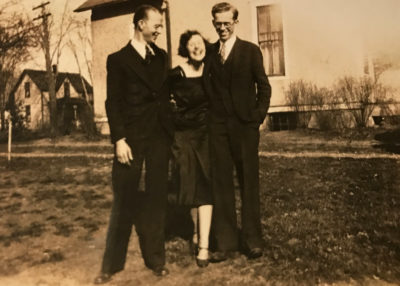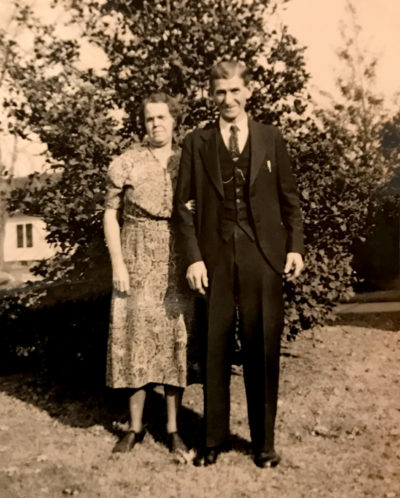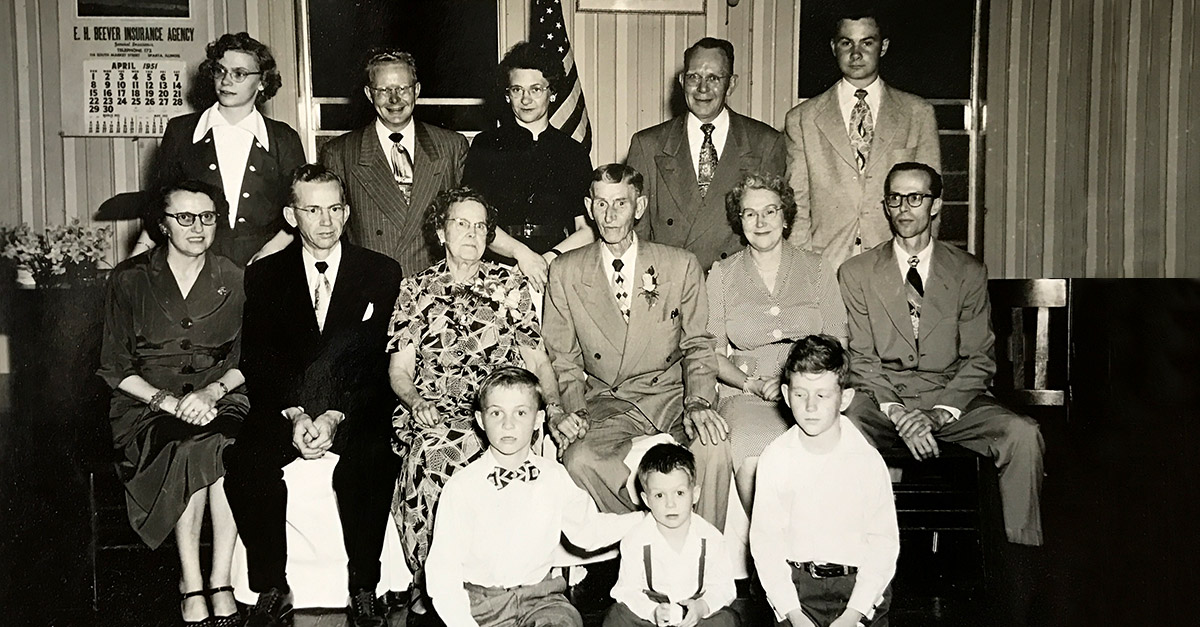“Death ends a life, not a relationship.” ― Mitch Albom
We were alone that fall Saturday in Sparta, everyone else was across the street using the phone at my Aunt Pet’s house. I don’t remember everything grandpa and I talked about, I was only twelve, but I remember some of it. I wish we had talked more in my short years with him, in our time before that day.

Now, as a grandfather myself, it seems more important to understand family history, especially as told from the memories of the people who lived it. To this day, I wish I knew more of life in his small town in Southern Illinois, where everyone was somehow related. As an only child myself, I wonder how it was to have eleven sisters and brothers, all living in the same community, and I wish I knew how he met my grandmother and raised their three children.
Most of all, I wish I had heard more stories about my dad as a child. But that Saturday was not the day for those conversations.
On that day, the 80 year-old man was just my grandpa, a stoic and hard-working man, forced to his bed ever since the doctors took his leg off.

I knew this story. At first, grandpa had been too proud and embarrassed to tell anyone, even Eliza Jane Adams, his wife of 52 years, how he had accidentally shot himself in the foot trying to break up a scuffle at the frozen custard stand outside town several days before. Too proud for his own good it turned out.
Grandpa had been serving as Deputy Sheriff in Randolph County, Illinois, where he carried, but seldom used, a Smith & Wesson 38 Police Special. When he got home after the ruckus that evening, he made the choice to care for the wound himself. But it refused to get better. After awhile, the pain of the infection forced him to ask grandma for help. By the time the doctors were called, it was too late. The gangrene had traveled above his knee and his leg needed to come off.
Grandpa had many adventures in his long life, but on that Saturday in 1953 he wasn’t sharing stories about any of that. Instead, we just exchanged a few simple words before he took my untested young grip with his weathered hand. He asked again where the others were, and again, I told him they were across the street, calling his daughter.
Maybe he wondered why everyone, even his wife, had left only this young boy to stay with him in what were probably his final hours. I don’t know. All I know are the words, “Take good care of yourself, Bruce.” Then his eyes closed.
It seemed like a long time before the others came back from Aunt Pet’s. When they finally walked in the parlor I just said, “I think grandpa is dead.” The rest is a blur.
Today, families might not choose to let a child of twelve stay alone with a dying grandparent. It would generate considerable discussion, I think. But 60 years ago, in Southern Illinois, it was just part of the cycle of life.
How much of your family’s history do you know? What choices did your ancestors make? Were any of their choices as costly as my grandpa’s?
Do you have stories that go with the many names and dates in your ancestry? Please share some of them, because, for me, it’s the stories that bring history to life. That’s the message in Storytellers Are The Best Teachers. Have you read it?
As always, the conversation starts here.
“In the ordinary choices of every day we begin to change the direction of our lives.” – Eknath Easwaran
Epilogue
The feature photo at the top of this post, taken on April 30, 1951, was at grandpa and grandma’s Golden Wedding Anniversary where they celebrated in his Odd Fellows’ lodge. The lodge was on the second floor of a brick building, on Main Street, not far from their home in Sparta, Illinois. Can you find me in this picture?
Odd Fellows, along with other fraternal organizations, are not as popular today as they were in the early 1900’s and although I knew my grandpa was a member, I hadn’t looked deeper until now.
After watching this video, it looks like a club I would like – still “odd” – but odd in a good way.


Bruce, thank you for sharing this story. That must have been something for you, being with your Grandpa when he passed on, and the only one in the room with him. I was lucky to have known all my grandparents. Though we saw the ones from Holland less often, my mother always filled us in with stories about them, and what it was like growing up. I have one story, it’s not about choices, but it’s one of my favorites she used to tell. My Grandfather used to captain a commercial ship. They traveled to the Great Lakes, and in… Read more »
Jennifer – Yes, then my grandmother died about 10 years later. I did not know either of my mother’s parents. You are fortunate to have known all of your grandparents, it’s great that your mother kept in touch with her parents in Holland and told you their stories. I think your ship captain grandfather would have made thousands of choices. Crossing the North Atlantic in winter, coming into the Great Lakes via the Saint Lawrence Seaway, all would be challenging. A bad choice could leave them frozen in for weeks, I would think. How far west did he travel in… Read more »
Hi Bruce, I spoke with my Mother and she does not think he made it to Duluth, said they entered into large ports like Chicago, Montreal, and I think Detroit. It was a 1/2 passenger, half cargo ship. I had her tell me about the icing over again and I got a great earful. She told me their ship actually was ice-locked. It was docked in the harbor, the lake was froze over, so they could not leave until it thawed out! So there was a “choice” he made. Some years before the iced-in the harbor winter, he was working… Read more »
Jennifer –
How wonderful that you talked with your mother about the stories from your grandfather’s days on his commercial ship. Indeed, his choice at the time of mutiny is important – along with how that choice lead to his promotion to captain.
It’s the stories that go with the black and white photos that provide the most value. I hope that story of choices is preserved in your family.
Thanks for being in the conversation.
– Bruce